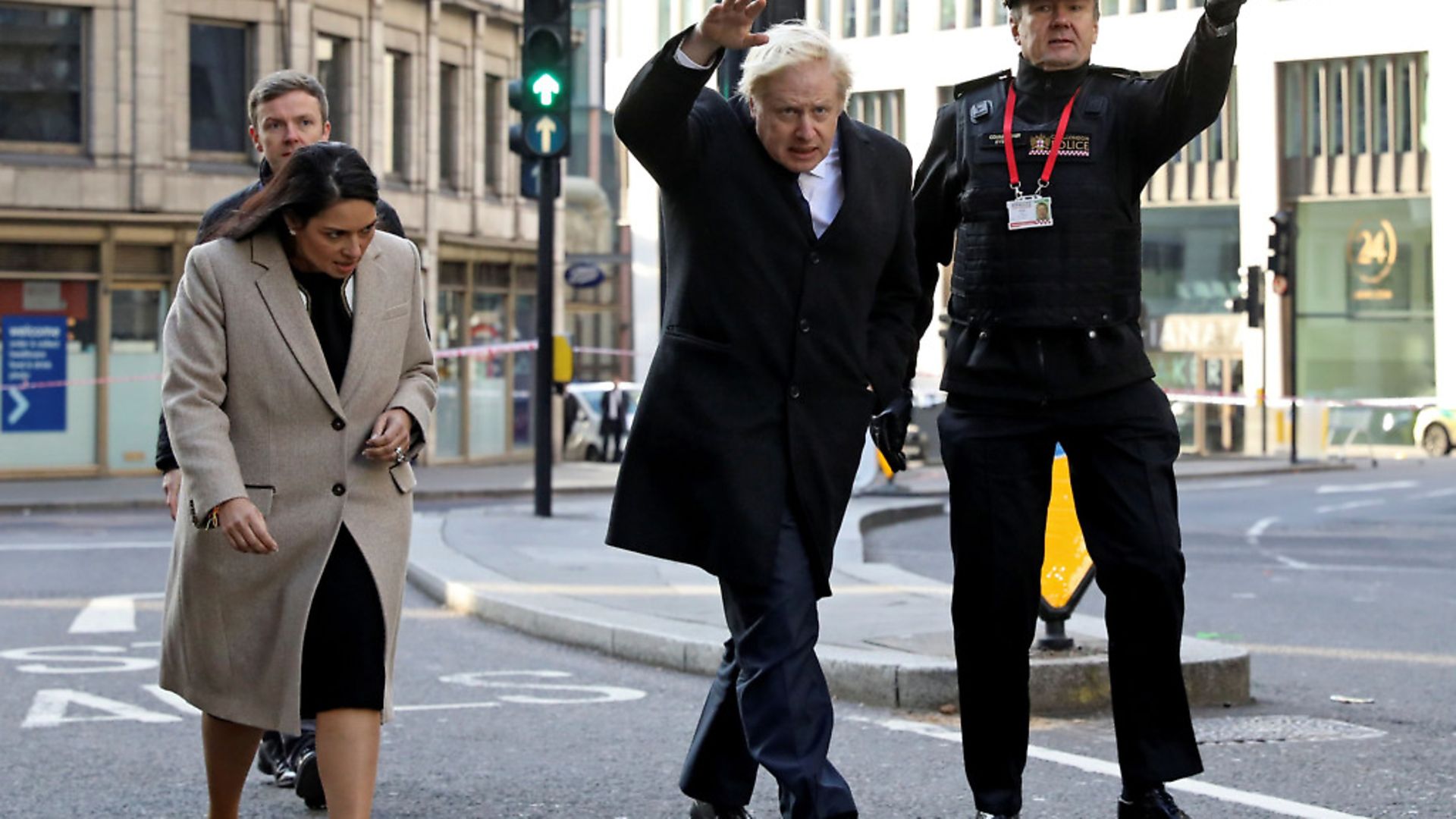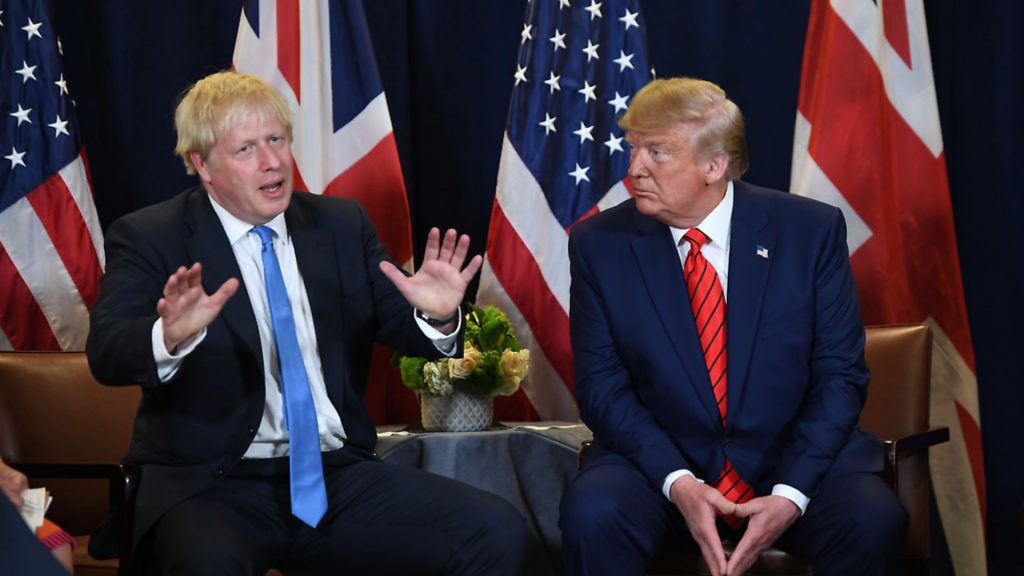
The New European’s Editor-at-Large fears dark and dangerous times if Johnson is elected with his own mandate and majority.

I have now reached the point with Donald Trump that when he comes on the television, I reach hurriedly for the remote and switch to Sky Sports. The lies, the bluster, the boasts, the insults about anyone who challenges or disagrees, the narcissism, the sense he is more interested in ratings for his never-ending one-man reality TV/social media show than he is in meeting the challenges of the modern world… the combination of it all renders the truth that he is president of the United States too grisly to contemplate.
As this joyless, miserable election grinds on, Trump taking a walk-on part at the Nato summit, I increasingly feel the same about Boris Johnson being prime minister, and react in the remote-zapping same way, for many of the same reasons.
As with Trump, you keep thinking Johnson can go no lower, and then he does. As with Trump, you keep thinking surely now we have reached the point where the public have seen enough of the falsehoods to know that if we as a country knowingly elect a proven and seemingly compulsive liar as a prime minister, we are shaking one of the most important guardrails of our own democracy.
As with Trump, you keep thinking there will be a point at which shame surely kicks in, and leads to a change in conduct. As with Trump, you think how many more people have to spell out evidence of his misogyny before women in droves decide they cannot support him?
Yet, for pussy-grabbing in the States read not knowing how many children you have here, and not caring much about their fate either. None of it seems to disqualify Johnson, just as none of it disqualified Trump.
So what was the low point that led to a quick channel-switch because a lower league highlights show was preferable to seeing and having to listen to the prime minister? Answer – his clear, cynical exploitation of the terror attack on London Bridge.
Even as the news was coming in Johnson, who is permanently attuned to the thought ‘how can this help Boris Johnson?’ turned his mind to that very question. The answer came in two parts. 1) Suspend election campaigning. 2) Immediately exploit the attack by propelling it centre stage in the election campaign.
Of course, the prime minister should have a role when something like the killings by Usman Khan takes place. The question is how he carries out that role. There is a limit to what he can do, so the role is defined mainly by what he says, and that is, or should be, relatively straightforward. Condemnation. Sympathy for victims and families. Support for and thanks to police and security services. Praise for public who helped. Assurance that anything government can do to help will be done. Reassurance of general safety. Urging, nonetheless, of vigilance. Defence of basic values. Determination that life must go on.
I had my suspicions that Johnson would be looking for something more suited to his own needs when – while driving from Wolverhampton to Burnley for dinner with Sean Dyche after campaigning for my old friend Pat McFadden – I listened on the radio to Metropolitan Police assistant commissioner Neil Basu. He read out a statement which he ended by saying he could not answer journalists’ questions because Johnson had asked for a personal briefing and so Basu and other senior officers had to head to Downing Street, to where the prime minister was returning from the campaign trail.
If you look at the Met’s official website, you’ll see that part of the statement was not included in the published version, perhaps reflecting its own irritation at being dragged away from the job of investigation to the task of making the prime minister look prime ministerial, a quality he had been failing to display on the campaign trail.
The PM has both the right and indeed the responsibility to be kept informed so that he can take any decisions that may require the input of government. But was that the best use of those officers’ time at that moment? Or was the real purpose of his summoning them to Number 10 to project Johnson’s image in a way that benefited his campaign? Given one of the default responses of politicians in the event of terrorist activity is to say that ‘we will not allow them to change our way of life or our democracy’, I am not persuaded that a temporary suspension of the election campaign was the best way to show this. The purpose of Johnson’s decision was more likely to get the other parties off the campaign battleground.
Tory strategists feel they are well ahead of Labour, and that if nothing goes badly wrong, they are home and dry. Yet their confidence stems as much from how badly Jeremy Corbyn and Jo Swinson appear to be going down than it does from any rising warmth towards Johnson.
So they are playing things as safe as they can, mindful that their candidate has a low attention span, a high need to be centre of attention and a tendency to ill-discipline. Having the debate dominated by terrorism is a better space for their approach than what might be termed normal electioneering.
Of course, having such an overwhelmingly sycophantic or supine media helps them even more. Generally, whatever message the Tories want, that is the message that dominates print and airwaves.
Some of that might be explained by Labour weakness in strategy and media. Much of it is not. The BBC had been talking tough in saying they would not have Johnson on The Andrew Marr Show on Sunday morning unless he agreed to follow Nicola Sturgeon and Jeremy Corbyn into the chair opposite Andrew Neil. That they changed their minds on the basis of the news value of the incident played into Johnson’s hands. Essentially, they were saying they would have him as prime minister at the time of a terrorist incident, rather than as Tory leader fighting a campaign. It’s Boris Johnson we are talking about here, BBC!
Johnson was, as he has been in most of his interviews in recent weeks, a bit of a shambles. But, nicely teed up by the lickspittle Sunday papers, he got the headlines he wanted out of it, namely a direct attack on Labour for the incident taking place, and a call for a tougher approach not just on terrorism, but broader issues of crime and punishment.
It took self-confessed Conservative, professor Ian Acheson, who had headed a government review on extremism, to spell out how “crazy austerity cuts… the destruction of the prison and probation service” were far more relevant political factors. Declaring himself “depressed” by the debate sparked by the incident, he said: “We are now reaping what we sowed.”
In blaming Labour despite his party having been in power for almost a decade, in linking the deaths directly to new policies he claimed to have long supported, in generating headlines about “locking them up and throwing away the key”, Johnson could not have been clearer in his attempt to politicise the incident as an electoral campaign issue, even as he was saying campaign hostilities were in abeyance out of respect for the seriousness of what had taken place.
As with Trump though, Johnson is incapable of showing respect to anyone or anything other than himself and his own ambitions. Trump walked ahead of the Queen – disrespectful enough. Johnson lied to her.
Compare and contrast the crassness of Johnson at the weekend with the class of grieving father David Merritt, who tweeted: “My son Jack, who was killed in this attack, would not wish his death to be used as a pretext for more draconian sentences.” The very pretext Johnson was already planning to exploit, and no words from the victims’ families would get in the way.
Describing his son as a champion for those who had been dealt a losing hand in life, David Merritt went on: “RIP Jack: you were a beautiful spirit who always took the side of the underdog.”
These are words unlikely to be part of Johnson’s epitaph when it comes. He will care less about that than the fact that, bang on cue, right on message, totally on the Tory script, several of the papers led on Monday morning with headlines about the “Boris blitz” on jihadis.
That the same grieving father would take to social media to condemn those papers for using his son’s death, and picture, “to promote your vile propaganda” and spread hatred, intolerance and division – things Jack Merritt worked against – will worry Johnson even less. As I discovered on the phone-in on Channel 5’s Jeremy Vine that morning, his tactic had paid off. The calls flooded in… lock them up and throw away the key… terrorists rampaging around the place… London is not safe… Johnson knew exactly what he was doing and I do not believe any of his predecessors would have done the same.
If he is elected as prime minister with his own mandate and his own majority, I fear dark and dangerous times ahead. As with Trump, nobody can say we have not seen enough of his character, and its badness, to feel we have been warned.









